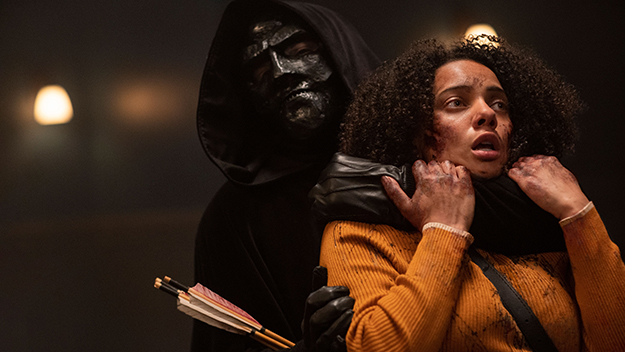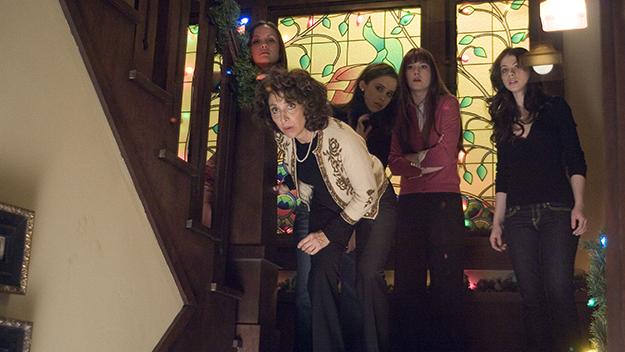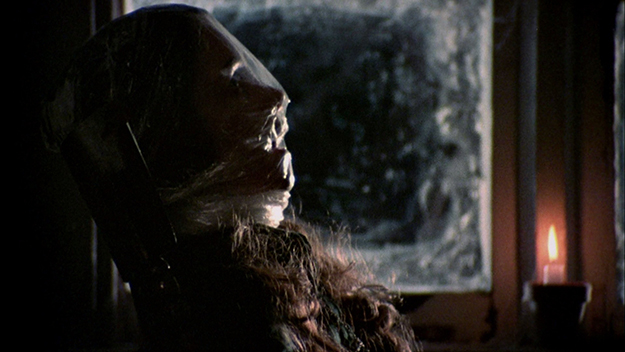Classified: Writing Black Christmas
Classified is a regular column on genre by April Wolfe.

Black Christmas (Sophia Takal, 2019)
As both a critic and screenwriter in a time of well-trod IP, I’ve had to develop a simple ethos around the idea of remakes and how to assess or approach them. A remake, in my opinion, must warrant itself beyond the craven cash grab. It must make the case for its existence in the here and now, and it must reflect its environment. The best remakes are those whose IP can function like a time capsule that’s opened every ten to forty years to examine the thoughts, fears, and ideas of its generation, i.e. Invasion of the Body Snatchers and all its iterations. Otherwise, what’s the point? Why make the same movie in exactly the same way? Gus Van Sant’s shot-for-shot Psycho remake in 1998 was a fascinating experiment that already showed it’s impossible not to infuse a film with the aesthetics of your time period. If one is going to remake, one should lean into it.
That’s the approach director Sophia Takal and I took with the remake of Bob Clark’s Canadian classic Black Christmas, a film that had already been remade (or sequelized, depending on how you view it) once in 2006 by Glen Morgan. That production, famously plagued by Harvey Weinstein’s overbearing notes and reshoots, led to a much-maligned adaptation that’s only recently been given a fair and honest reappraisal. One essay worth searching out is Brian Collins’s loving elegy in Fangoria, on both the film and the aura of mid-aughts horror remakes in general. In it, he obliquely makes the case that, though many horror movies are representative of their times, audiences are nearly incapable of appreciating those movies upon release—it should be noted that Clark’s Black Christmas was only beloved by a small handful of Canucksploitation aficionados (myself included) until Morgan’s film invited a more widespread reappraisal of the original, much in the same way that our version invited reappraisal of Morgan’s.
It is as though we cannot bear to look in the mirror in the moment, but with safe distance can hesitantly open one eye and see our reflection. This is who we were, not this is who we are.

Black Christmas (Glen Morgan, 2006)
Sophia and I were, of course, very aware of this going in, but it only emboldened us to make “time capsule” choices. Take, for instance, the setting: a college campus. Clark’s film was released a year after Roe vs. Wade and only a few years after many prestigious colleges and universities officially opened their doors to women. If you were watching Clark’s film the movie in 1974, you would be all too aware of this dynamic and how it affected a story about a faceless man harassing and ultimately murdering women, including one seeking an abortion, inside their own safe haven. In short: it would be heavy-handed as hell.
In 2019, Sophia and I looked at the atmosphere of college campuses and leaned in. The struggle of a young woman today is one of sexual assault and endless discourse on free speech and inclusion. Young women in college are versed in the terminology of sexual and power politics and speak on it at length with wry humor, cultivated from a life online, in the same breath as they opine on their fave cut of underwear. They contain multitudes, and what was once subtext is text. What is subtext now are issues of intersectionality that have no easy answers—like race, class, and gender essentialism.
With this in mind, we created the character of Kris, played by Aleyse Shannon. Kris is 1974’s Barb (Margot Kidder) after four years of gender studies courses and a few wonderful dates with women. She’s humorous but excruciating, both for her nonstop truth-telling and for how often she is maddeningly right when nobody wants to hear it. And then there is Riley, played by Imogen Poots, who carries more nuance and complexity. She lived through date rape, but she is not defined by it; so many horror films that depict sexual assault survivors leave their characters cold, numb, and boring. But this was 2019. Shortchanging that character wasn’t going to fly, and the easiest way to portray emotional intelligence on screen is to give a character some laugh lines and self-awareness. For instance, Riley’s allowed to make an off-color crack about being an orphan when her sorority sister Jesse (Brittany O’Grady) asks if using the term “orphan” in a cutesy context was okay. Riley’s face drops: “Wait, my parents are dead?” she asks in feigned horror. (This was also a meta-commentary on the trope of the “girl with dead parents,” whose life is defined by her missing family’s legacy. See: Scream.)

Black Christmas (Bob Clark, 1974)
Kris and Riley are two sides of the same coin, and we approached the other characters as archetypes of people we knew in the real world: the blissfully unaware vain best friend you turn to for a pick-me-up (Jesse), the tough exterior woman who sees rocking the boat as overreaching (Marty), the fresh-faced kid sister who’s more than happy to toe the line for the status quo if it means she’ll get what she wants (Helena). From these characters grew both the story and the scares.
For a period of four weeks during our main scripting process, Sophia and I tossed drafts back and forth at such a harried pace that producers could barely keep up with us. All in, we went through around fifty drafts in that time and probably another fifty while we were in New Zealand during Sophia’s prep. What this constrained timeline for writing offered us was the opportunity to make Black Christmas first a “feeling” film and second a “thinking” film. There was no time to question our biggest swings. We weren’t Babe Ruth calculatingly pointing his bat into the stands to foreshadow the trajectory of his home run. Instead, we were in the ninth, bases loaded, ready to bunt if we had to. Every anxiety Sophia and I felt about the world on fire made it into this film. There is no way someone from the future could watch this and not know the horrors of 2019.
In my heart of hearts, I hope another Black Christmas comes along someday. Perhaps this one could be set at a commuter school, or maybe with a low-income scholarship student amid a sea of wealth and privilege. But who knows what the world of higher education will look like then? Whatever it looks like, I’d hope a new Black Christmas would boldly present it, flaws and all, to be opened and examined years later when everyone’s ready to accept the past.
April Wolfe is formerly lead critic for LA Weekly. She currently hosts the Switchblade Sisters podcast, and has written for The Village Voice, AV Club, the Washington Post, and The Wrap.







